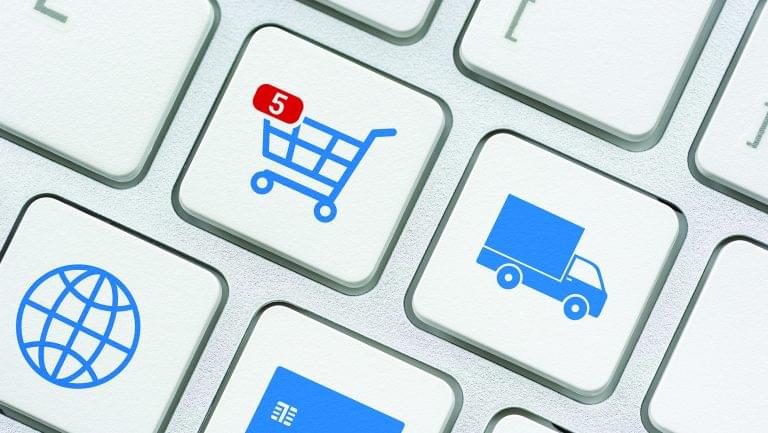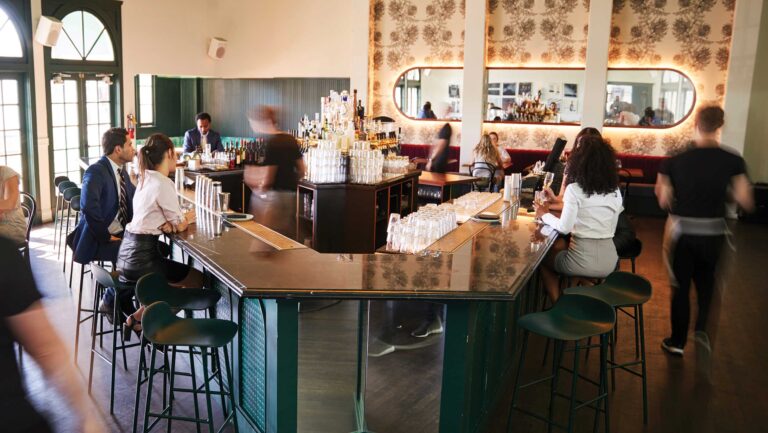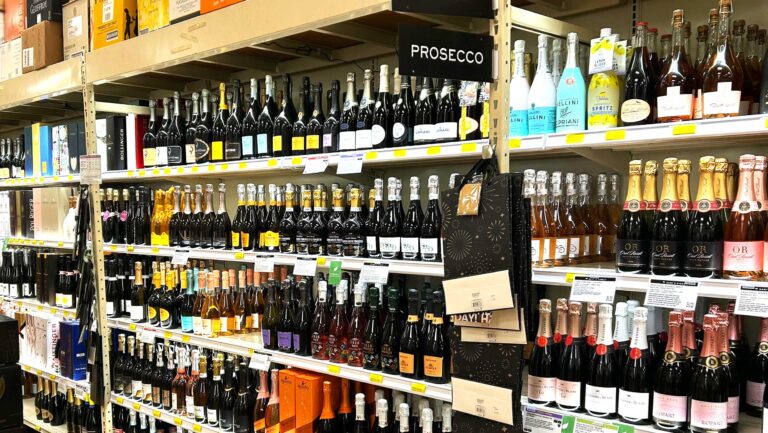Pick up any industry publication over the last year and you’re almost certain to read a story about the growth of online beverage alcohol sales during the pandemic. Some of the figures are mind boggling: Drizly reported increases of 350 percent year-on-year, Wine.com ended their fiscal year up 115 percent, and the IWSR reports an 80 percent increase in the value of ecommerce alcohol sales overall.
This news makes it clear that customers are ready and willing to purchase wine and other alcoholic beverages online. Less clear is what retailers can do to meet this demand and get a piece of the action—while following federal, state, and local regulations.

Don’t miss the latest drinks industry news and insights. Sign up for our award-winning newsletters and get insider intel, resources, and trends delivered to your inbox every week.
In this article:
- Understanding Ecommerce
- Local On-Demand Delivery
- Intrastate Shipping
- White Label Storefronts & Marketplaces
- Interstate Retailer Direct Shipping
Understanding Ecommerce
It’s old news that each of the 50 states and the District of Columbia has its own distinct set of post-Prohibition policies aimed at efficiently collecting taxes, minimizing the sale of alcohol to minors, promoting temperance, and keeping organized crime out of the distribution system. What is new is the conversation around ecommerce—and the feeling that these wild growth numbers could indicate that long-standing regulations may be loosening up, tilting the system in favor of consumer access, convenience, and value.
Those regulations depend on what’s being sold—and who is selling it. While domestic wineries have seen tremendous growth in their ability to sell to consumers across the country, distilleries and breweries continue to be more heavily restricted. Recently, the efforts of smaller craft producers seeking to reach new markets during the pandemic has led to new legislation—for example, Kentucky recently allowed wineries, breweries, and distilleries to ship to consumers within the state.
However, at the retail level, regulations on interstate ecommerce remain highly restrictive—for all alcoholic beverage products. Although terms like “delivery,” “ecommerce” and “direct-to-consumer (DTC)” shipping are often used interchangeably, retailers looking to capture some of this much-discussed sales growth need clarity on these terms—and what they require in terms of investment and costs. Top-line sales growth is great, but only if it eventually increases your shop’s profitability.
Marc Goodfriend, CEO of Boxcheck, a technology software company specializing in compliance, shipping, and customer experience solutions notes, “When you shift to selling online, the complexities increase exponentially. You have to worry about things like remote age certification, state and local laws you may not be familiar with, complex carrier rules, clunky tax filings—there is a lot of hassle involved to sell wine online.” Much of this depends on what state you’re located in and where your potential customers are. The further they are from your shopfront, the greater the operational complexity, as all the elements of what Goodfriend calls the “holy trinity ‘data’ grail of tax, compliance, and shipping logistics” come into play.

Local On-Demand Delivery
Last year, shops with little or no online presence needed to set up a web store and sort out an on-demand delivery/pick up program, in some cases literally overnight. Companies like Drizly were able to help shops gain this online presence, growing their number of retail partners from 1,800 in early March 2020 to over 4,000 by year end.
This is a big deal: The immediate ability to create an online presence helped many businesses continue to serve existing customers as well as reach new ones. And many states, like Georgia, Arkansas, and Ohio, which previously didn’t allow any form of delivery service, legalized it, giving shops in these states the opportunity to build a program either in partnership with a delivery app, or on their own.
However, at its core, this sort of on-demand delivery model isn’t as disruptive as the massive growth numbers might indicate. The customers remain local and the bottles are simply exchanged at the curb, on the porch, or in a building lobby, rather than across the counter.
Operational complexity does increase though: Retailers will still need to comply with any local delivery zone restrictions and ensure that customers receiving wine are over 21 whether the delivery is completed by in-store staff or by a third party. Also, the additional logistics of picking, packing, and facilitating online orders adds additional costs—so it’s important to monitor profitability, not just sales growth.
Sales tax collection for these local sales remains straightforward … until recently. A wave of marketplace facilitator laws have added additional complexity for shops working with on-demand delivery platforms. Jeff Carroll, general manager for beverage alcohol at Avalara, a tax compliance company, explains that these laws are beginning to transfer the burden of collecting and remitting sales tax from the retailer to the service provider. He suggests that retailers working with these companies ask lots of questions to understand how this is being handled now and in the future as they may need to make adjustments to their own sales tax reporting processes.
Intrastate Shipping
Moving beyond the neighborhood delivery zone, many states allow retailers to use common carriers such as UPS and FedEx to reach customers within their state lines. Where allowed, intrastate shipping presents an opportunity for smaller specialty retailers to introduce their shop and selection to a larger audience without wading into the full thicket of compliance and taxation complexities required to ship across state lines.

That said, retailers still need to be well aware of compliance issues within their own state borders. Some states, such as Florida, Alabama, and Kentucky, will have dry or “moist” counties where shipping is prohibited. Common carriers will require retailers to sign an alcohol-specific shipping contract that mandates special packaging, labelling, and the use of an adult signature requirement at the point of delivery. In some cases, these contracts may specify that only wine or grape-based products may be shipped, so retailers will need to clarify what items are specifically allowed within their state. Policies will also need to be put in place to account for potential fraudulent purchases, damaged shipments, and undeliverable packages.
While it takes time and patience to set up a UPS or FedEx wine shipping account, it’s relatively easy to do. However, the additional logistics and costs associated with these services, such as pick up fees, packing materials, and additional staff require that retailers look closely at margins, especially if a shop offers free or low-cost shipping rates.
White Label Storefronts & Marketplaces
Relatively new to the scene, white label storefronts offered by companies such as Barcart, Speakeasy, and Passion Spirits are set up to give the impression that customers are purchasing a specific product directly from the producer’s branded web site. Emerging platforms like these have much in common with ecommerce marketplaces such as Vivino and ReserveBar that act as one-stop shops for multiple brands.
While giving the appearance of a DTC transaction, they are all three-tier compliant, with the actual sale completed and fulfilled by a retailer who purchases the product from an in-state distributor. In that sense, they are similar to on-demand delivery platforms, but often with an emphasis on premium service over speed.
Josh Jacobs, cofounder and CEO of Speakeasy Co., a platform focused on craft beverage alcohol brands, says, “As with any ecommerce platform, tapping into the Speakeasy network increases sales, and since Speakeasy owns virtually all components beyond fulfillment, partners can scale leanly without building out large teams to support marketing, customer service, and technology.”
Retailers that already have robust fulfilment capabilities should explore partnering with these platforms to generate incremental sales and leverage their logistical expertise. They should also consider if their buying philosophy aligns with that of their potential partner. For example, ReserveBar is focused on promoting established brands distributed by large, national wholesalers while Speakeasy’s mission is to support the emerging brands that struggle to find representation.
As with on-demand deliveries, shops should carefully monitor their costs to ensure that any incremental sales are translating into incremental profits. And while the marketplace or white label partner provides the technology platform, Avalara’s Carroll recommends additional questions including, “How does the money flow? Is it transparent who the seller is? How is age verification being handled?”
Interstate Retailer Direct Shipping
All of the platforms discussed above involve products sold within a single state’s three-tier system, since orders are typically fulfilled by retailers within the state. In most states, the available products will represent only a fraction of the long-tail of thousands of domestic and imported wines and spirits sold by small importers to small regional or single-state distributors.
If the larger scale, well-marketed brands handled by the largest players in the distribution system represent the interstate roads of the alcoholic beverage world, then these smaller networks are more like the blue highways. The retailers who specialize in this segment are well-suited to reach customers in other states who want access to products they can’t find locally—and are willing to pay the often-substantial shipping costs.

However, the ability to conduct this sort of cross-state commerce is currently highly restricted. The landmark 2005 Granholm v. Heald Supreme Court ruling that laid out the non-discrimination principles that paved the way for channel growth has been applied to producers only, not retailers. Currently there are only 15 states and the District of Columbia that allow out-of-state retailer shipping and only a handful of those allow spirits.
Managing even that limited number of states requires a level of commitment to Marc Goodman’s “holy trinity” of logistics, tax collection, and compliance well beyond the requirements of the previously discussed options. Even if a retailer has a contract set up with a common carrier for in-state shipping, additional costs and processes such as permit fees, sales, and excise tax collection for multiple jurisdictions and various compliance considerations like household volume limits will now come into play.
“The good news is there are software solutions that can be plugged into your ecommerce platform to provide automated sales tax calculation and collection,” explains Larry Cormier, general manager at Sovos ShipCompliant, one of the leading compliance software providers. “Many of those platforms also include the capability to perform real-time compliance checks. At the time of the order, the software will confirm that the retailer is licensed in the destination state and in compliance with all state regulations regarding things such as household volume limits.”
The not-so-good news is that the costs involved with the required permits and the compliance services may assume a scale that runs counter to many of the smaller specialty shops trying to reach a handful of customers scattered across the country. In some cases, small-scale affords a form of special dispensation. For example an out-of-state retailer doing less than $100,000 worth of annual sales in some states may not be required to collect and remit sales tax. But as Avalara’s Carroll notes, “You’re putting the burden on the consumer. That’s the thing that’s often misunderstood—that tax is always due,” and in many cases, there are still filing requirements that seem quirky at best and purposely complicated at worst.
“Research is key when a retailer is in the DTC discovery phase. When choosing states to start shipping to, they should consider consumption rate, permitting costs and the amount of licensing paperwork required,” explains Cormier. Retailers should reach out to services such as Sovos ShipCompliant, Boxcheck, and Avalara to understand the associated costs and options of building a program focused on their chosen states.
Legal challenges, legislative changes, and aggressive enforcement policies are constantly evolving, so retailers should also follow company blogs and sign up for free webinars to stay up to date. With an eye to a more streamlined process, the National Association of Wine Retailers (NAWR) supports a Model Wine Retailer Shipping Bill as part of its ongoing lobbying efforts at the state level. Modeled on a similar proposal which has worked for wineries, it recommends straightforward provisions for in-state permitting, sales tax collection, adult signature verification, and other regulatory standards.
“Despite the fact that wineries and retailers are almost always treated differently by states where out-of-state shipments are concerned, the fact is that the transaction is identical,” says Tom Wark, executive director of NAWR. “Consumers visit the winery/retailer website. They select the wines they want. They place them in a shopping cart. They attest to their age. They pay with a credit card. The retailer/winery collects sales tax based on the state they are shipping to. The retailer/winery uses common carriers to ship the wine to the customer.”
Given all of the complexities and costs above, it’s not surprising that growth in retail interstate shipping lags other forms of wine ecommerce. But as Boxcheck’s Goodfriend explains, “We’re watching an industry that has been around forever start to intersect with the digital age and what’s coming from that is a new, modernized tool set that gives retailers new ways to scale their customer base and reach new markets.”
For retailers ready to move beyond their own main street storefront, life on the blue highways beckons.

Dispatch
Sign up for our award-winning newsletter
Don’t miss the latest drinks industry news and insights—delivered to your inbox every week.
Christy Frank is a partner at Copake Wine Works, a shop in the Hudson Valley of New York. She is an advanced sommelier with the Court of Master Sommeliers and holds the WSET Diploma in Wines.







